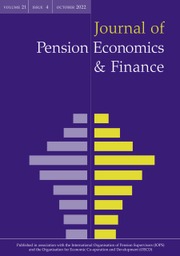Crossref Citations
This article has been cited by the following publications. This list is generated based on data provided by
Crossref.
Tanaka, Jumpei
2019.
A note on “raising the mandatory retirement age and its effect on long‐run income and Pay As You Go (PAYG) pensions”.
Metroeconomica,
Vol. 70,
Issue. 1,
p.
68.
Cipriani, Giam Pietro
and
Fioroni, Tamara
2019.
Human Capital and Economic Growth.
p.
209.
Bucci, Alberto
and
Prettner, Klaus
2020.
Endogenous education and the reversal in the relationship between fertility and economic growth.
Journal of Population Economics,
Vol. 33,
Issue. 3,
p.
1025.
Aslanyan, Gurgen
and
Mariev, Oleg
2021.
PAYG challenge for preferential migration.
Journal of Pension Economics and Finance,
Vol. 20,
Issue. 2,
p.
301.
Cipriani, Giam Pietro
and
Fioroni, Tamara
2022.
Social security and endogenous demographic change: child support and retirement policies.
Journal of Pension Economics and Finance,
Vol. 21,
Issue. 3,
p.
307.
Turner, John A.
2022.
International Handbook of Population Policies.
Vol. 11,
Issue. ,
p.
571.
Zhang, Linlin
Gu, Jiale
and
An, Yunbi
2023.
The optimal delayed retirement age in aging China: Determination and impact analysis.
China Economic Review,
Vol. 79,
Issue. ,
p.
101972.
Bonatti, Luigi
and
Lorenzetti, Lorenza Alexandra
2023.
Long-term economic implications of Demeny voting: A theoretical analysis.
Economic Systems,
Vol. 47,
Issue. 4,
p.
101151.
Koka, Katerina
and
Rapallini, Chiara
2023.
Italy’s demographic trap: Voting for childcare subsidies and fertility outcomes.
European Journal of Political Economy,
Vol. 76,
Issue. ,
p.
102264.
Jaimes, Richard
and
Westerhout, Ed
2023.
Optimal policies in an ageing society.
The Journal of the Economics of Ageing,
Vol. 26,
Issue. ,
p.
100475.
Cipriani, Giam Pietro
and
Fioroni, Tamara
2024.
Human capital and pensions with endogenous fertility and retirement.
Macroeconomic Dynamics,
Vol. 28,
Issue. 2,
p.
478.
Pramanik, Sabyasachi
2024.
Emerging Perspectives on Financial Well-Being.
p.
1.
Pramanik, Sabyasachi
2024.
Recent Developments in Financial Management and Economics.
p.
350.
Li, Chao
2024.
Determinants of Retirement in China: A Lifecycle Analysis of Pension Scheme and Health.
SSRN Electronic Journal,
Yu, Changlin
and
Li, Yanming
2024.
Housing prices, social security, and fertility rate.
Review of Economics of the Household,
Florea, Nicoleta Valentina
Croitoru, Gabriel
Robescu, Valentina Ofelia
Florea, Daria
and
Croitoru, Mihai Bogdan
2024.
Social and Ethical Implications of AI in Finance for Sustainability.
p.
41.


